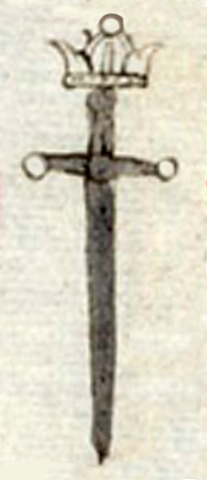San Pablo (CST26)
This painting of the simplex glyph for the name of the Christian saint, San Pablo (St. Paul), shows a vertical sword with its point down. The top of the sword has a European crown on it, and below that is the grip and crossbar. The sword is an iconographic shortcut for naming San Pablo; it refers to the way Pablo was beheaded in Rome in the first century C.E.
Stephanie Wood
For more on the Codex Sierra, see Kevin Terraciano’s study (2021). Glyphs of saints are known, some with more Nahua influence than is visible here. See below.
Stephanie Wood
1550–1564
Jeff Haskett-Wood
espadas, martirio, iconografía cristiana y Católica, nombres de santos, hombres de hombres

San Pablo
Stephanie Wood
Códice Sierra-Texupan, plate 26, page dated 1559. Origin: Santa Catalina Texupan, Mixteca Alta, State of Oaxaca. Kevin Terraciano has published an outstanding study of this manuscript (Codex Sierra, 2021), and in his book he refers to alphabetic and “pictorial” writing, not hieroglyphic writing. We are still counting some of the imagery from this source as hieroglyphic writing, but we are also including examples of “iconography” where the images verge on European style illustrations or scenes showing activities. We have this iconography category so that such images can be fruitfully compared with hieroglyphs. Hieroglyphic writing was evolving as a result of the influence of European illustrations, and even alphabetic writing impacted it.
https://bidilaf.buap.mx/objeto.xql?id=48281&busqueda=Texupan&action=search
The Biblioteca Digital Lafragua of the Biblioteca Histórica José María Lafragua in Puebla, Mexico, publishes this Códice Sierra-Texupan, 1550–1564 (62pp., 30.7 x 21.8 cm.), referring to it as being in the “Public Domain.” This image is published here under a Creative Commons license, asking that you cite the Biblioteca Digital Lafragua and this Visual Lexicon of Aztec Hieroglyphs.






